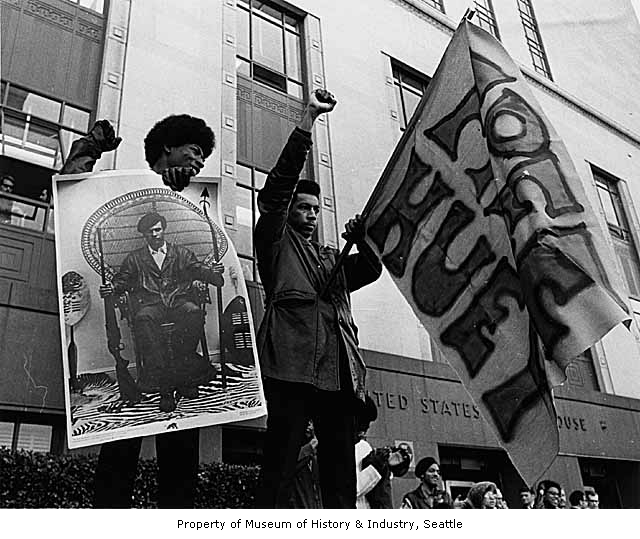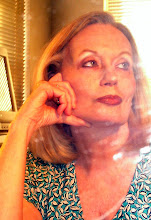
Somewhere during 1965, during the end of winter shading into spring, I traveled up to Williams College to see my fiance. College life was still prissy then, especially in the little three Ivy League: Williams, Dartmouth, and Amherst. A visit to my fiance necessitated that I be stashed someplace respectable while there: ideally in one of those dreary bed and breakfasts around town. But this time the bed and breakfasts were full up, so my boyfriend made arrangements with his friend Don, who was now married. This was more than fine with me. I was very fond of Don; he was gentle, intelligent, and funny too, older than the other students. He was handsome as well: tall and well-built. I still remember his rare happy laugh, it went on and on, rushing like water. Still, most of the time, he gave me the impression of being very guarded in some way I didn't understand, and very emotionally isolated. But that could have been because he was black, one of only three black students at Williams.
My boyfriend and I went over to Don's around twilight. I remember it was a freakishly cold evening during what should have been a warming season. The ice had begun turning into slush and it slopped into my shoes, freezing my feet. The house where Don and his wife lived was tiny, and on the very edge of town; there was nothing else around it except fields and a road. I can remember there was a porch where a yellow light burned, and I remember how the boards squeaked. Don ushered us in quickly and introduced us to his wife, who was shy, sweetly welcoming, and heavily pregnant.
He was the same nice Don, but marriage, or something else had changed him for the better. Now, he seemed more fully focused, less introverted, but that night he also had an air of distraction. Apologetically, he led us both into a hallway and showed us a ladder. The house didn't have a spare bedroom, but there was an attic. Don and his wife had piled the attic floor with quilts; I could see them up there, all homemade, glowing with color. Don looked at me questioningly. I hurried to say that I loved the idea, which was true. Something about that little house, the stack of quilts, and the dark night coming on fast, threw me back in time, back to when I was a child, when I loved coziness, especially on a frigid night.
Then Don mentioned that my boyfriend and I might want to stay there, up in the attic, but just for a while. Some friends were coming over, he explained. They were having a meeting. It was a political thing, he said, nothing to do with us. I thought this rush to tuck us away was a little odd, but I didn't worry. Everything was always about politics then, and everyone was always paranoid. So we shrugged, said okay, and climbed up the ladder into the attic. Don reappeared in the attic's opening a few minutes later, holding two mayonnaise jar lids to use as ashtrays, and then he scrambled down. People were already knocking at the door.
Curiously, my boyfriend and I peered down as the visitors came in; then we yanked ourselves back, and stared at one another. Perhaps twenty people in all eventually arrived, all men, all black, all armed, mostly with rifles and shotguns. I remember that part very clearly, because I'd never seen so many guns before. My fiance put his finger to his lips in warning, and I nodded.
I don't have any memories of the actual words said that night, only sense impressions. Everyone at the meeting was angry: at the government, at the war, at white people. Everyone talked excitedly, loudly, butting in on one another. A lot of the discussion was the kind of very detailed philosophic talk popular back then, the kind I could never follow. I could follow this discussion though. Black people had to take matters in to their own hands. King was a hankie-head. Non-violence was fucked. Whitey was fucked too. There were no good whites.
My boyfriend and I flattened out on the floor, listening, hoping to stay undiscovered. I wasn't afraid, although I thought we might be in danger, but mostly I was profoundly shocked. I didn't understand how these men could hate all white people. There were good ones, weren't there? (I was one, surely.) I thought of the gentle black people I'd known growing up. Did they really feel the way these men did? Were they as fed up and furious, but stuffed that rage inside and only showed their quiet, smiling selves? Like many white people, I had no idea how angry blacks actually were.
Although it was dramatic, that night didn't teach me much. I just thought I'd happened in on an eccentric sliver of some radical group; so I did what I always did when faced with an unpleasant truth. I trivialized what I'd seen and the words I heard. For me, the convincer didn't arrive until Martin Luther King was assassinated and the whole East Coast turned a dull red with flames and rioting.
Those days of rage would last a long time. They would last for years. I don't think we, as white people, ever really knew why all that happened.
I wonder now if we'll ever catch on to the source of that fury.
And if we finally do, I wonder how we'll bear the knowledge.
My boyfriend and I went over to Don's around twilight. I remember it was a freakishly cold evening during what should have been a warming season. The ice had begun turning into slush and it slopped into my shoes, freezing my feet. The house where Don and his wife lived was tiny, and on the very edge of town; there was nothing else around it except fields and a road. I can remember there was a porch where a yellow light burned, and I remember how the boards squeaked. Don ushered us in quickly and introduced us to his wife, who was shy, sweetly welcoming, and heavily pregnant.
He was the same nice Don, but marriage, or something else had changed him for the better. Now, he seemed more fully focused, less introverted, but that night he also had an air of distraction. Apologetically, he led us both into a hallway and showed us a ladder. The house didn't have a spare bedroom, but there was an attic. Don and his wife had piled the attic floor with quilts; I could see them up there, all homemade, glowing with color. Don looked at me questioningly. I hurried to say that I loved the idea, which was true. Something about that little house, the stack of quilts, and the dark night coming on fast, threw me back in time, back to when I was a child, when I loved coziness, especially on a frigid night.
Then Don mentioned that my boyfriend and I might want to stay there, up in the attic, but just for a while. Some friends were coming over, he explained. They were having a meeting. It was a political thing, he said, nothing to do with us. I thought this rush to tuck us away was a little odd, but I didn't worry. Everything was always about politics then, and everyone was always paranoid. So we shrugged, said okay, and climbed up the ladder into the attic. Don reappeared in the attic's opening a few minutes later, holding two mayonnaise jar lids to use as ashtrays, and then he scrambled down. People were already knocking at the door.
Curiously, my boyfriend and I peered down as the visitors came in; then we yanked ourselves back, and stared at one another. Perhaps twenty people in all eventually arrived, all men, all black, all armed, mostly with rifles and shotguns. I remember that part very clearly, because I'd never seen so many guns before. My fiance put his finger to his lips in warning, and I nodded.
I don't have any memories of the actual words said that night, only sense impressions. Everyone at the meeting was angry: at the government, at the war, at white people. Everyone talked excitedly, loudly, butting in on one another. A lot of the discussion was the kind of very detailed philosophic talk popular back then, the kind I could never follow. I could follow this discussion though. Black people had to take matters in to their own hands. King was a hankie-head. Non-violence was fucked. Whitey was fucked too. There were no good whites.
My boyfriend and I flattened out on the floor, listening, hoping to stay undiscovered. I wasn't afraid, although I thought we might be in danger, but mostly I was profoundly shocked. I didn't understand how these men could hate all white people. There were good ones, weren't there? (I was one, surely.) I thought of the gentle black people I'd known growing up. Did they really feel the way these men did? Were they as fed up and furious, but stuffed that rage inside and only showed their quiet, smiling selves? Like many white people, I had no idea how angry blacks actually were.
Although it was dramatic, that night didn't teach me much. I just thought I'd happened in on an eccentric sliver of some radical group; so I did what I always did when faced with an unpleasant truth. I trivialized what I'd seen and the words I heard. For me, the convincer didn't arrive until Martin Luther King was assassinated and the whole East Coast turned a dull red with flames and rioting.
Those days of rage would last a long time. They would last for years. I don't think we, as white people, ever really knew why all that happened.
I wonder now if we'll ever catch on to the source of that fury.
And if we finally do, I wonder how we'll bear the knowledge.




No comments:
Post a Comment